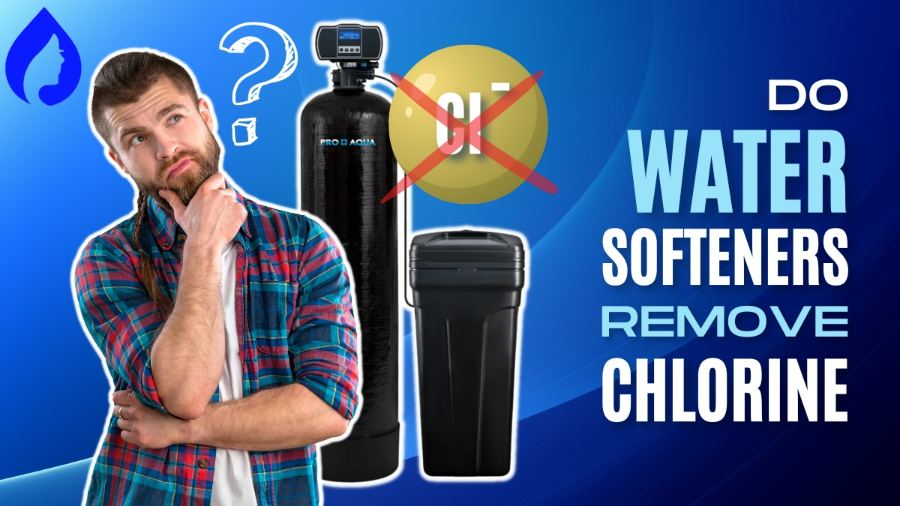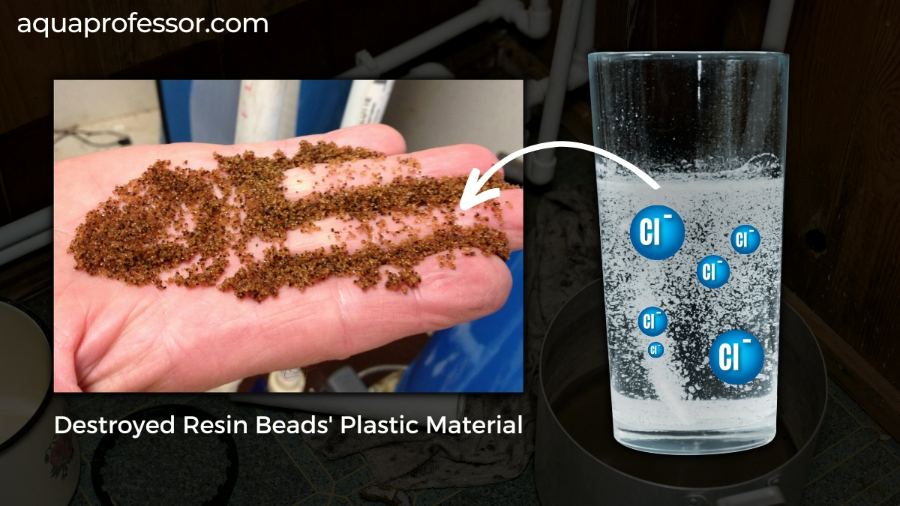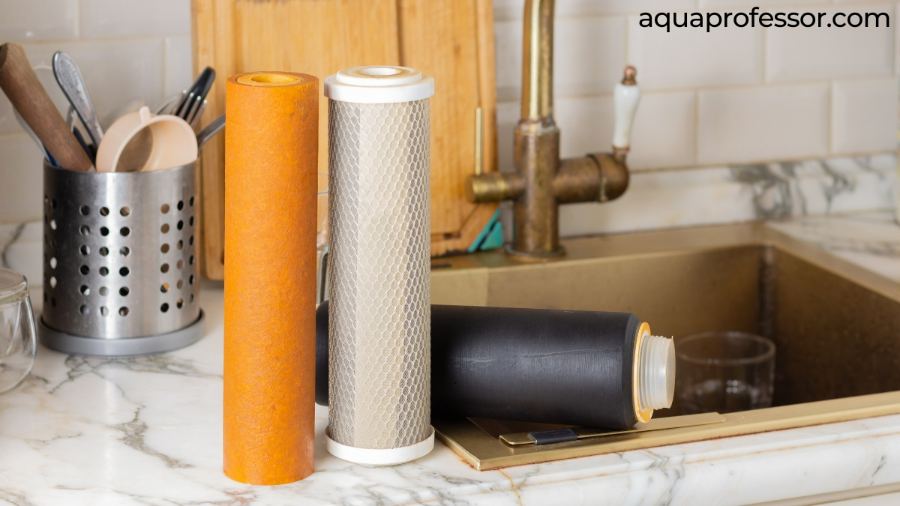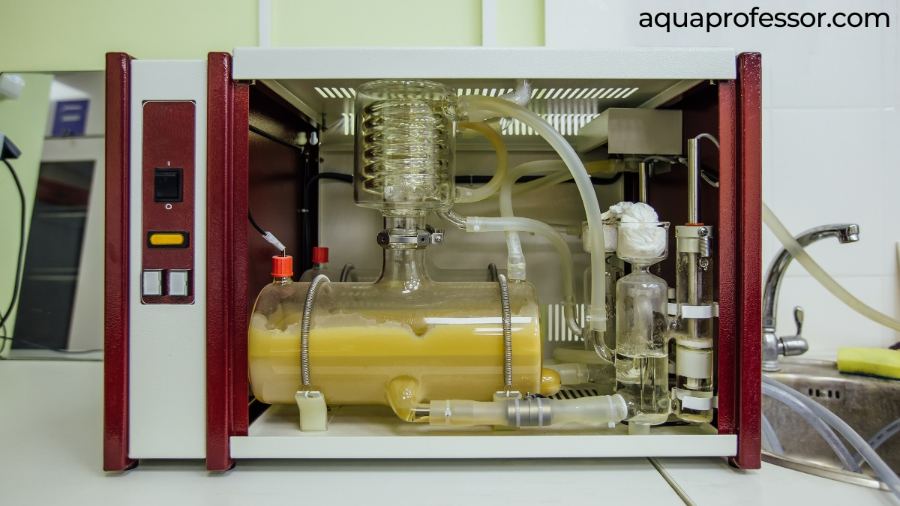
Pissed off by the bad taste and smell of chlorine from your tap water and thinking of buying a water softener?
Unfortunately, water softeners cannot remove chlorine to provide you with chlorine-free water. They can only remove hard water minerals like calcium.
On the flip side, more than one ppm of chlorine can damage the water-softener resin bed and its beads. Continue reading for practical methods to dechlorinate water without a water softener.
🤔 What Happens to the Chlorine in a Water Softener?

Water softener softens water through an ion exchange technique. All-in-one softeners are designed to free your water from all kinds of water-hardening minerals and thus soften your water efficiently.
Here’s what it looks like:
The hard water passes through the water softening resin beads (containing ionic charges), exchanging the calcium and magnesium ions with sodium.
After approximately ten years, these sodium-inundated resin beads, losing their ionic charge, get occupied with calcium and magnesium deposits, resulting in scale buildup and thus need replacement.
However, if you allow chlorinated water (more than one ppm) to pass through your water-softening machine, the chemical will destroy the resin beads’ plastic material, thus causing them to swell up and break, snipping half the lifespan of your softener.
Also, chlorine (Cl), a corrosive chemical element, acts as an oxidizer and breaks down your water-softening machine’s gears, pistons, and rubber gaskets, thus damaging the device entirely and calling for its replacement much before the expected replacement time of the softener.
So, if your area’s water comprises a high quantity of chlorine, removing or reducing the chlorine levels becomes necessary. Always ensure that the chlorine is filtered out before it enters your water softener.
What To Do?
To remove chlorine and other contaminants, you can install a whole-house chlorine filtration system at your home. This way, you can get chlorine-free softened water and also save your water softener from getting damaged.
Also Read: Does Well Water Have Chlorine?
🥛 How To Remove Chlorine From Water?

To remove chlorine from water, you first need to determine the quantity of chlorine in your home water.
The easiest way to test for chlorine in drinking water is by using a tapscore kit.
After checking for chlorine, go for any of these solutions as per the test results:
🔄 Reverse Osmosis Filters
RO filtration method is the most recommended method for chlorine removal. It eliminates chlorine and several other toxic contaminants from your drinking water, thus making the water pure and safe.
With the help of the activated carbon and RO water filters, the machine makes your home water 100 % chlorine free (by absorbing and blocking the chlorine/chloramine, respectively).
The tiny pores of the RO membrane don’t allow even a single chlorine molecule to pass through it, thus making the water very much fit for consumption.
The downside is that the RO water system wastes a lot of water.
Also Read: Do Water Softeners Remove Fluoride?
⚫ Carbon Filters
Like an RO water filter, a carbon filter is a great way to remove chlorine from your drinking water. Also, it comes with the added advantage of a whole-house water filtration system.
There are mainly three types of carbon filters:
Note
You can also add granular activated carbon or GAC water filter to your water softening system to remove chlorine before the water passes to the water softener resin bed.
🎛 Distillers

This process involves passing the chlorinated water through the distillers.
A distiller first boils the water and then turns it into vapors. These vapors are then again condensed into liquids. Some of the chlorine is initially removed while boiling, and the remaining chlorine is turned into vapors and water vapors that the distiller removes.
Modern distillers use charcoal filters to remove chlorine present in the water and also other toxic substances from it. However, this method is time-consuming to implement.
If it’s just over one ppm and the only issue is smell and taste, then try out these natural methods to remove chlorine:
🧐 Do Water Softeners Remove Chlorine: FAQs
Is chlorine in water bad for you?
Chlorine in water is not bad if presented in less than one ppm. However, ingesting water over four ppm can affect your health. Chlorine, when it comes in contact with organic compounds, tends to form THMs (Trihalomethanes). These chlorine byproducts generate free radicals within our body that accelerate cell damage.
What chemicals do water softeners remove?
Water softeners remove hard water minerals like calcium (Ca) and magnesium (Mg) through ion exchange.
Some water softeners can remove heavy metals like iron and manganese (upto 1 ppm), radium, and copper (though copper can re-enter from your water pipes or household plumbing system).
Do water softeners add chlorine to water?
No, water softeners never add chlorine to your water. Their function is to remove calcium, magnesium, and other hard water minerals from water.
The chlorine in your tap water comes from municipal or city water distribution systems. They do water chlorination to purify it from harmful chemicals.
Do water softeners remove fluoride?
No, water softeners are not designed to remove fluoride. The softening resin beads of a water softener cannot attract fluoride ions, thus incapable of removing them from water at the time of the ion exchange method.
You can only remove this chemical element by installing a fluoride-trapping filtration system using reverse osmosis.
Is there chlorine in soft water?
Yes, chlorine may also be present in soft water. A water softener exchanges calcium and magnesium ions into sodium ions but cannot make the water chlorine-free. So, never expect the water to get dechlorinated just because you allowed it to pass through a water softener. On the other hand, passing chlorinated water through your water softener may produce adverse effects on the machine’s resin bed.
Adarsh is a Health & Nutrition Sciences graduate with expertise in environmental health. He is associated with ventures like Glacier Fresh Filter and Simpure Filter Systems. Through Aqua Professor, he intends to provide helpful information to every home to help them make smarter decisions.
